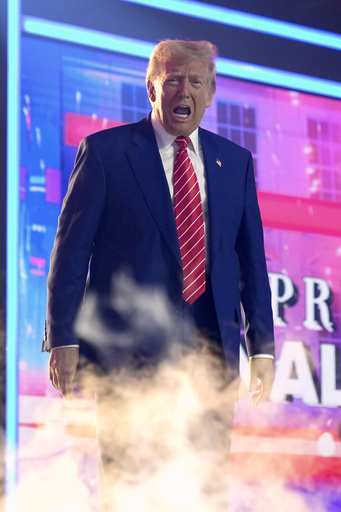
PHOENIX — Amid discussions of a potential government shutdown in Washington, far-right leaders convened with a large gathering of Donald Trump supporters, reveling in the factionalism within the Republican Party. This convergence occurred at Turning Point USA’s AmericaFest 2024, where many celebrated the role that Trump and billionaire Elon Musk played in derailing a bipartisan agreement intended to maintain government operations. Detractors from the right openly criticized House Speaker Mike Johnson for his willingness to collaborate with Democrats, despite his close ties to Trump.
At the event, prominent Trump adviser Steve Bannon expressed a stark viewpoint, denouncing bipartisanship as a detrimental force within the political realm. “The political class is infected with a malignant cancer. The cancer is bipartisanship,” he proclaimed. Bannon further argued for an emphasis on hyper-partisanship, calling for Johnson’s removal from his leadership role, underscoring a desire for a more confrontational political atmosphere.
Trump’s influence remains robust among his core supporters, who expect him to cater to their demands. This reliance contributes to the uncertainty that characterized the recent budget discussions and hints at future disputes within the wider Republican coalition. Although Trump was unable to secure his primary goals—with 38 Republicans opposing a budget plan he supported—this seemed irrelevant to Bannon and others. What mattered more was Trump’s centrality in the ongoing political contest. “Thank you, God, for sending us Donald Trump,” exclaimed Turning Point founder Charlie Kirk as Trump took the stage, eliciting cheers from thousands.
At AmericaFest, conversations revealed that, while attendees shared loyalty to Trump, their motivations were diverse. A mixture of anti-establishment views, conservative social values, and overt patriotism defined this new right movement, rather than a singular policy consensus. “I just want everything Trump said he was going to do,” stated Andrew Graves, a former Disney employee turned Arizona organizer for Turning Point, stressing evidence of a wide range of personal policy priorities.
Others echoed different sentiments, such as Jennifer Pacheco, a Southern California student who found a semblance of hope in Trump’s leadership, desiring a renewed presence of faith in the nation. Many supporters were unaware of the intricacies of Trump’s fiscal proposals, including his intention to eliminate the national debt ceiling during his forthcoming term. This lack of awareness indicates a tendency among attendees to focus more on Trump’s persona than on the details of his policy agendas.
As the event progressed, it became clear that attendees broadly yearned for a revival of national strength, encapsulated by Alexander Sjorgen’s aspirations for robust energy production and a review of America’s international commitments. “For the most part, we all just want to see the country strong again,” he emphasized, reflecting a shared sentiment among participants.
The convention buzzed with enthusiasm, underscored by the display of Trump memorabilia and individuals in Revolutionary War attire. Prominent figures commanded attention, receiving enthusiastic applause as they discussed various proposals, from confirming Trump’s Cabinet appointments to potential imprisonment for those who investigated the January 6 Capitol attack.
Kirk characterized the moment as a reclaiming of the nation but cautioned that the transformation within the Republican Party was incomplete. He threatened primary challenges against GOP senators who might oppose Trump nominees, emphasizing his influence over the party’s future direction. Bannon depicted the attendees as pioneering a revolutionary movement, drawing parallels between Trump’s rise and the historical shifts seen in the 1932 election.
Throughout a lengthy address, Trump reiterated numerous policy promises without acknowledging his recent legislative setbacks or the speculation surrounding his intentions toward Johnson. He framed his remarks in vague terms, declaring, “Last month, the American people voted for change,” while hinting at a brighter future for the nation.
As Kirk, Bannon, and other speakers elaborated on Trump’s plans, they occasionally recognized the complexities inherent in his proposals. Bannon acknowledged the obstacles Trump faced in securing his budgetary goals yet expressed confidence in Trump’s ultimate plans for spending reductions. Other influencers sought to clarify discrepancies regarding foreign aid, with commentators like Ben Shapiro deliberating on the nuances of Trump’s long-standing support for Israel versus the general aversion to foreign aid among conservatives.
Retired General Michael Flynn, a controversial figure from Trump’s earlier administration, asserted that conservatives do not reject international involvement but are against unnecessary conflicts. “I’m not anti-war,” he stated, “I’m anti-stupid war.”
In closing, Kirk sought to unify attendees across various factions within Trump’s coalition, emphasizing that differing focuses—be it supporting parental rights, the Second Amendment, or health initiatives—could all harmonize under a shared goal. “Whatever focus group you have, as long as we can agree on the big stuff … we need to combine forces and defeat the incumbent regime,” Kirk urged, echoing the core mission of Trump’s movement.
